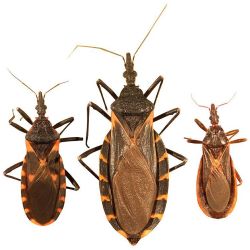Sniffing Out Strategies to Control Chagas Disease

Chagas disease is a parasitic infection in dogs and humans caused by the protozoa known as Trypanosoma cruzi. Dogs become infected when they ingest the feces or bodies of infected kissing bugs (see Figure 1). They can also become infected by blood transfusions or via transmission from a dam to her puppies. The disease is found in South and Central America, Mexico, and in the southern United States – especially in dogs housed in multi-dog kennels. Wildlife such as raccoons and opossums can also be infected with T. cruzi and serve as a reservoir for the parasite near dog kennels and human housing. Symptoms of Chagas disease vary and can be acute or chronic and mild or severe, including sudden death. Damage to the heart muscle, resulting in progressive heart disease, is the most common sign of infection. Unfortunately, there are no effective vaccines or treatments for the disease for dogs or humans. Therefore, preventive strategies aimed at reducing exposure to kissing bugs are key.
With funding from AKC Canine Health Foundation (CHF) Grant 02448: Canine Chagas Disease: Characterizing Cardiac Abnormalities, Vector Infection and Control Strategies, and Parasite Strains in Kennel Environments, investigators at Texas A&M University College of Veterinary Medicine have been working to better understand Chagas disease in dogs. They recently published the surprisingly high risk of infection in dogs housed in 10 different kennels in Texas, reinforcing the need for improved strategies to prevent kissing bug exposure. (Read “Chagas Disease Risk for Dogs in a Kennel Environment.”) Their research also involves studying the biology of kissing bugs and the wide range of clinical signs seen in dogs with Chagas disease.
Understanding kissing bugs -
To limit dogs’ exposure to kissing bugs, we need to understand the life cycle of this insect. Knowing where they nest and develop would improve the surveillance of kissing bug populations and help with their control. Unfortunately, little is known about kissing bug development since most of the insects collected are adults found around humans or kennels. To improve kissing bug collection in their natural habitat, CHF-funded investigators used a trained detection dog to locate the insect at multiple sites across Texas in the fall of 2017. More kissing bugs were collected per hour when the detection dog was used compared to humans searching alone. Testing of the bugs revealed that 27% of immature kissing bugs were infected with T. cruzi and that they had fed on woodrats, opossums, and rabbits. Efficiently finding the kissing bug nests and understanding the host organisms that help spread Chagas disease will help inform disease prevention strategies in dogs and humans.
Accurate testing -
Another barrier to controlling Chagas disease in dogs is getting an accurate diagnosis. The current gold standard blood test for dogs is only offered at one diagnostic lab, requires subjective interpretation, and can cross-react with other disease-causing organisms such as Leishmania species. In search of a better option, the CHF-funded research team evaluated a new type of diagnostic test (known as a multiplex microsphere immunoassay, or MIA) for T. cruzi antibodies in dogs. Testing for antibodies against nine different T. cruzi antigens (disease-specific molecules that stimulate the immune system), Leishmania, parvovirus, and a negative control sample revealed that the MIA test is a valid method to diagnose Chagas disease in dogs. In fact, it may be a better test option than current methods because it is precise and can be quickly run on multiple samples. Additional study is needed to understand how the MIA test will perform on samples from borderline infected dogs (samples in which not all Chagas disease antigens are present) and to explore cross reactivity with Leishmania.
Ongoing research –
CHF and its donors are investing in research across the country to better understand the organism that causes Chagas disease as well as how to control, prevent, and treat the resulting disease. Active studies are:
-
exploring the risk of Chagas disease in dog populations outside of the southwest US,
-
examining how co-infection with other pathogens (such as the bacteria that causes Lyme disease) influences clinical disease,
-
evaluating the effectiveness of commonly used flea and tick preventatives on local kissing bug populations, and
-
continuing to develop a more accurate blood test for canine Chagas disease.
Chagas disease research benefits both ends of the leash. Humans and dogs live in the same environments and are exposed to the same insects and animals that spread this deadly disease. What we learn about Chagas disease in one species will likely help both. This One Health approach is key to CHF’s mission to advance the health of all dogs and their owners. Learn more about research on Chagas disease and other infectious diseases at akcchf.org/immunologyRPA.
Related Articles
- The Heart of the Matter: Heartworm Disease in Dogs (04/24/2024)
- The Canine Immune Response to Valley Fever (03/20/2023)
- Chagas Disease Risk for Dogs in a Kennel Environment (08/10/2021)
Help Future Generations of Dogs
Participate in canine health research by providing samples or by enrolling in a clinical trial. Samples are needed from healthy dogs and dogs affected by specific diseases.



